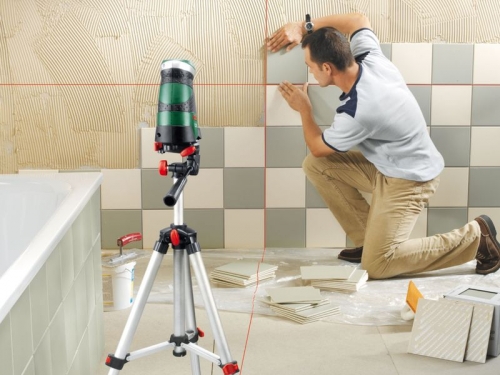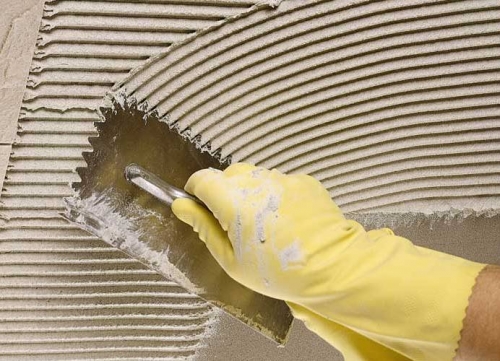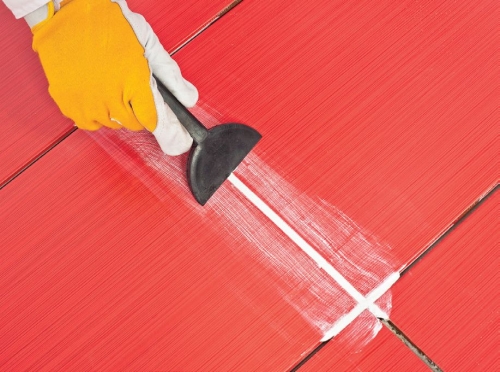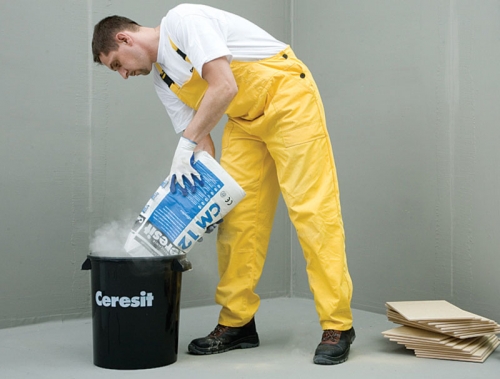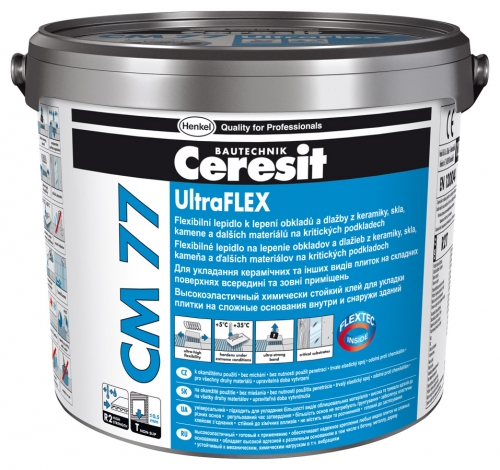The harsh climate of our country had a huge impact on the mentality of a Russian person and ...
|
|
Vinyl tile is incredible today. It is bought for ... |
Everyone, even the most high -quality foundation, over time needs restoration ... |
Glue for ceramic tiles: properties, composition and types
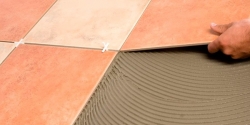
If you bought the most supermodic tile for a bathroom or bath, without a high -quality adhesive, the final result can upset you. In modern retail outlets, glues of domestic production are offered in abundance, as well as imported ones. However, it is not very simple to navigate. Let's find out how glue to glue ceramic tiles.
Content:
- Properties of adhesive
- Composition of glue for laying tiles
- Varieties of glue for ceramic tiles
- Criteria for chosen tiles
- Ready and dry mixtures
- Manufacturers of decorative tiles
Properties of adhesive
When choosing a composition for decorative tiles, you should know its beneficial characteristics. If the composition does not meet the listed requirements, it should not be bought in any case. Indeed, in such a time, no one gives a guarantee that the tile will hold on and will not fall off quickly. So, pay attention to:
- Plastic. This indicator should be moderate. If the composition spreads excessively, then you cannot make a suitable layer. The plasticity of the glue should not change, regardless of whether you made it thick or rare.
- Increased spreading. When selecting glue for floor ceramic tiles, remember that when applying, it should have the ability to fill all voids. Otherwise, the tile will simply disappear or break if some thing with a large weight falls on it.
- High adhesion characteristics. Simply put, glue should hold the material of any weight. It is good if this property is complemented by the speed of sticking to the surfaces. When laying porcelain tiles with large sizes, it will also be relevant.
- Lack of rapid surgery of water. You should always be able to adjust the tiles that were incorrectly attached during operation. It should be borne in mind that the glue should dry slowly. So he will gain the highest strength.
Composition of glue for laying tiles
Given the composition, the types of glue for ceramic tiles are as follows:
- Glues made on a cement basis. Due to the tolerable price, glue, which contains cement and sand, are most popular. In addition, a small number of polymer additives are contained in it. It is they who increase the characteristics of the glue its plasticity, water resistance, deformation range and adhesion of tiles with a facing surface. All components are hypoallergenic. Glue is sold in a dry consistency, which during work is diluted with water to a viscous substance.
- Dispersion adhesives. Such a composition has a higher price, but its cost is almost twice. He has increased adhesion properties to the surface, therefore the composition is used when attaching tiles on non -standard material: wood, plastic, metal surface, drywall sheets prone to bending and vertical surfaces and even on a slippery wall. In this case, there is no need to primer or grind the base. Dispersion adhesives for ceramic tiles are sold ready for further use.
- Epoxy adhesives. This substance is multicomponent, a catalyst is introduced into it in front of the tile sticker process, which is packaged into separate containers. However, before using the substance, remember that it does not forgive mistakes and needs dexterity and scrupulousness. If, for example, the glue fell on the finishing material, it should be immediately removed, because it will freeze, turning into a very strong substance. And it is almost impossible to eliminate. Epoxy glue is excellent for use in the open air, in rooms with high humidity. It does not respond to the effects of alkalis and solvents.
- Liquid Nails. This adhesive is relatively new. As a rule, it contains polymers with synthetic rubber. Liquid nails on a neoprene basis are characterized by increased strength, then they are toxic, in addition, they have a nasty odor. And a harmless water -based glue is not suitable for operation in a bathroom or bath. After all, it does not have moisture resistance. Thus, it is advisable to fasten ceramic tiles on liquid nails only during restoration repair, or if several mosaic fragments or small tiles are disappeared.
Varieties of glue for ceramic tiles
According to international classifications, glue for ceramic tiles is divided into the following groups:
- Glue for internal work. This composition is the cheapest and is intended for attaching tiles on the walls of household premises. In this substance there are few all kinds of additives that are responsible for improving its functional properties. However, glue for ceramic tiles quite qualitatively glues the standard tile to concrete and the base of brick. The main thing is that temperature changes, as well as high humidity, do not affect glue.
- Cleaning glue. This composition is characterized by a high level of adhesion and strength. Since it withstands significant stretching loads, it can be used for significant dynamic influences, high temperatures, for attaching the material on an old surface, for example, painted, or other facing (provided that it is kept firmly). Great for the use of stone and coarse tiles.
- Universal glue. The composition of the standard has this name, since it is used by almost all the tiles, when fastening the tiles outside the house and inside. However, this substance is developed for standard conditions. Operation where temperature fluctuations, high humidity or increased loads are not advisable. In addition, you should not with it glue tiles with dimensions of more than 30x30cm.
- Glue for floor tiles. It differs from others with a large percentage of the present plasticizer. Therefore, when laying tiles on the floor, the solution is able to fill all the voids. But it does not fit for walls, otherwise the tile will float. In other parameters, the glue is comparable to the standard.
- Moistenous glue. This composition is indispensable for use in the bathroom, bath, when lining with tiles of the porch, fountain, pool. This glue of increased fixation with the addition of a modifier, which is responsible for hydrophobic properties. It is not cheap, therefore, as an option, when laying tiles, you can use the composition of increased fixation, and then grind the seams with a water -repellent mixture.
- Specialized compositions. For example, this includes heat -resistant glue for ceramic tiles - for facing furnaces and fireplaces. White compounds are recommended when laying translucent tiles, as well as marble and mosaics, is to be laid. In addition, there are frost -resistant adhesives for an open balcony on sale.
Criteria for chosen tiles
When choosing an adhesive composition for lining with decorative tiles, it is recommended to take into account some criteria. There are only three global nuances. Let's look at them in more detail:
- Terms of Use. Take into account where it is to lay the tile. When carrying out work in the kitchen, buy glue, which is designed to work indoors, a universal version is also suitable, including for floor cladding. For the bathroom, it is worth selecting a more serious substance with water -repellent properties. However, you can always use the universal composition with a special grout for seams. For the pool, water -repellent, for the porch, frost -resistant glue for ceramic tiles.
- Characteristics of the base. When choosing adhesive for decorative tiles, take into account the properties of the composition for clutch with a certain material. Say, dry cement mixtures are not advisable to use for lining the floor from the OSB. Simple reasons are all solid, which are not amenable to deformations. These include brick, concrete, screeds from sand and cement, cellular concrete. Complex plastic, glass, metal and drywall, already lined with surface tiles, the base, which is easily deformed and subjected to vibrations. When lining with a small tile of simple bases in a dry room, it is worth buying glue, the adhesion coefficient of which is ~ 0.2-0.5 MPa. Facing complex surfaces requires adhesion of 1 MPa or more.
- The dimensions of the facing tiles. Remember: manufacturers say that the larger the sizes have tiles, the more severe adhesive is worth choosing. First of all, this rule concerns the procedure for facing walls, although usually in this case a large tile is not used. But when fastening floor tiles, you can buy a universal composition, because the material will stay well on it.
Ready and dry mixtures
When choosing glue for facing tiles, it is worth knowing that the compositions are produced in dry form (sold in bags) and ready (in buckets). How do such substances differ among themselves? All dry mixes have a cement base, ready -made are polyurethane. This difference affects the final value of the product on a polyurethane basis will cost you more.
At the same time, dry mixtures have significant advantages over ready -made:
- The dry composition allows you to fix the tile on the walls of any curvature. It can be used to align the walls, without making an additional surface plaster. But polyurethane glue for ceramic tiles requires perfectly even walls or floor, but is great for mosaic facing.
- The price of adhesive substance is lower. The difference is noticeable when buying the same volume of one and the other mixture.
- When analyzing the qualities of both compositions, it can be argued that both do their job perfectly. Polyurethane glue will hold almost forever, dry no more than 50 years. But if you get tired of tiles laid on glue on a cement basis, it will be possible to remove it faster, because the dry composition is easier to dismantle (for example, using a perforator). But polyurethane can only be removed along with the base.
Manufacturers of decorative tiles
Demand for dry glue for tiles is significant, so many companies have formed that are engaged in the production of such compositions. Consider the most famous:
- The adhesive composition is ordinary, reinforced, as well as accelerated fixation. The most popular brands: Polimin P-9, P-12, P-14, P-16, P-22; Siltek T-80, T-81, moment; glue for ceramic tiles Ceresit CM 11, CM 12, CM 17; Master Standard and Normal.
- Thermic mesh, which is intended for furnaces and fireplaces (-300-+1600 degrees): Master Flex, Polimin P-11, Siltek T-84.
- Glue for open balconies and terasses, pools, fountains, porch, floors with water heating and for fastening in rooms with exposure to humidity: Polimin P-24, P-25; Ceresit CM 17, Siltek T-84.
- Glue express, which serves for quick fixation: Polimin P-16, Ceresit CM 14.
- Glue for gluing mosaics, light tiles and made of marble: master crystal, Ceresit CM 115, Siltek T-82, Polimin P-23.
- Glue for stone, whether artificial or natural material: elastic moment; Master Stonefix; Ceresit CM 117; Polimin P-14, P-22; Siltek T-81.
Whatever happens, and you are simply obliged to choose the best glue for ceramic tiles, because the quality of gluing facing tiles, the durability of the operation of the finish depends on this. If you plan to work with the help of universal glue, then do not rush, but think over more and more detailed, since it has the limit of opportunities. Especially in what room the work will have to, what are the characteristics of the base.

